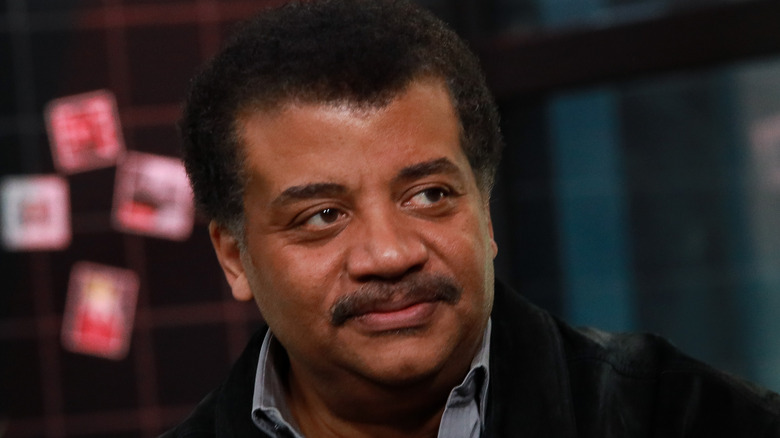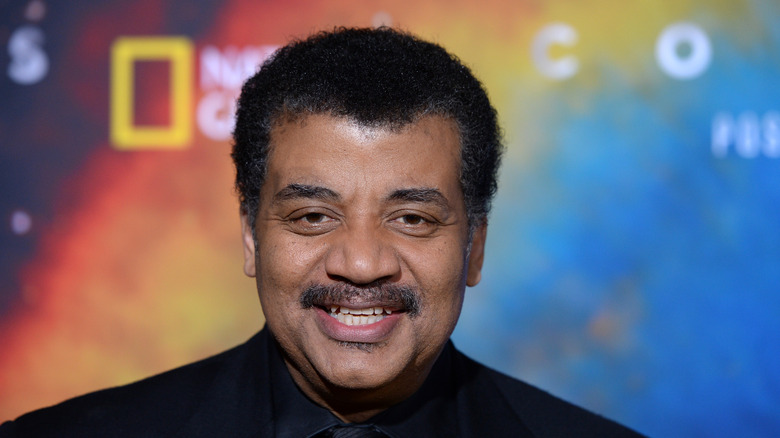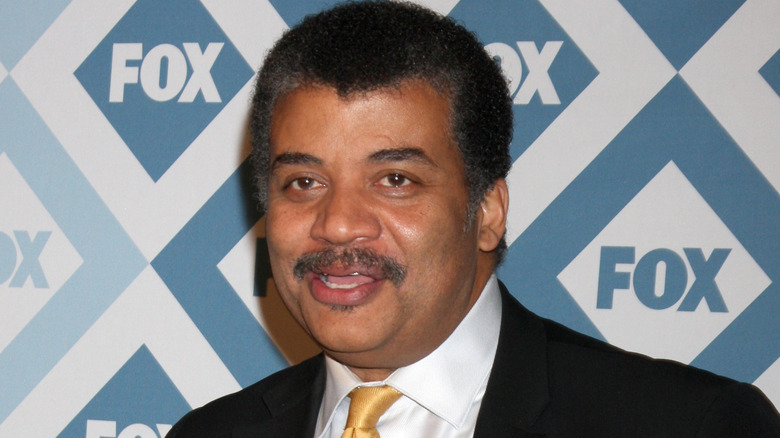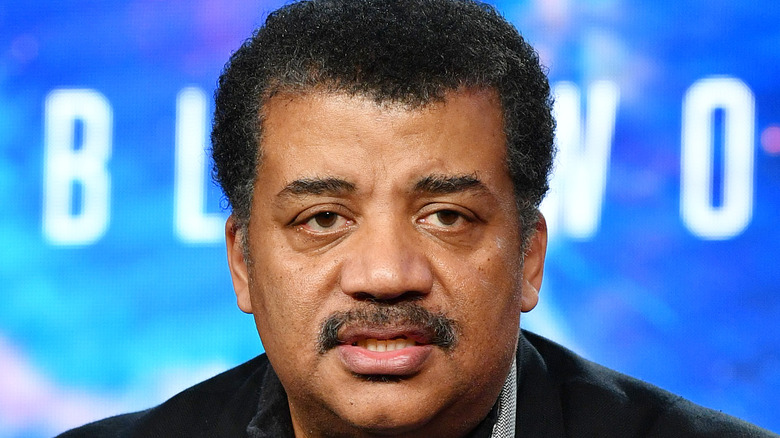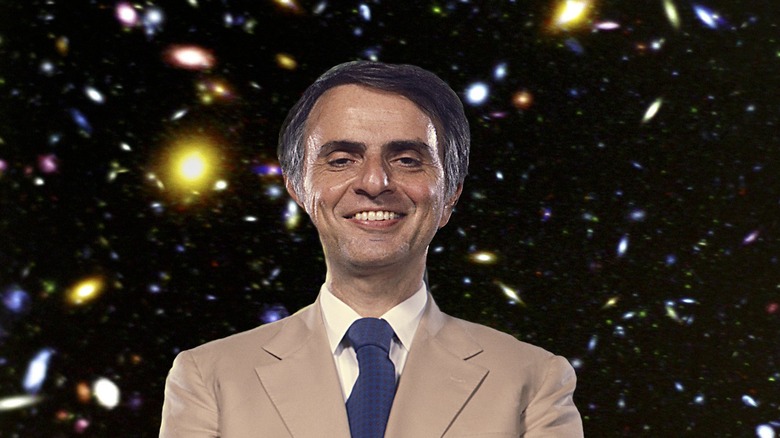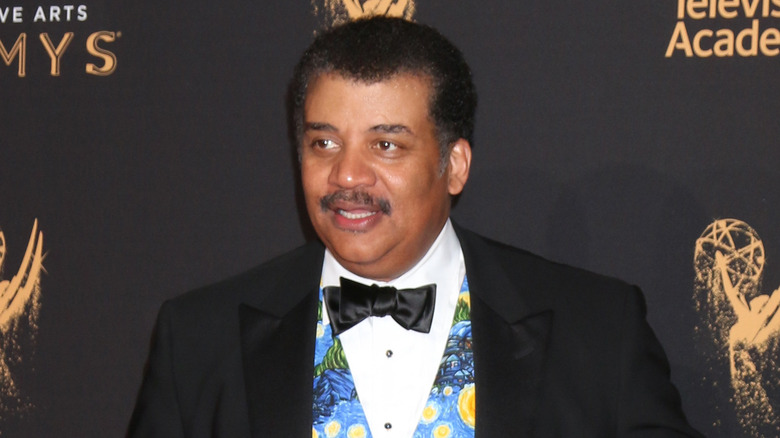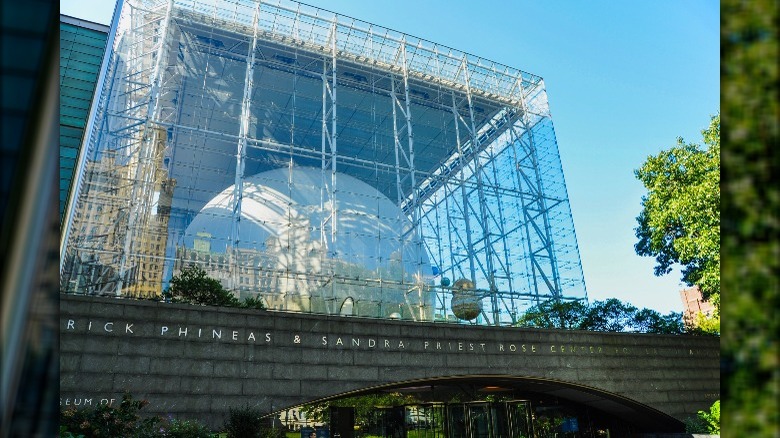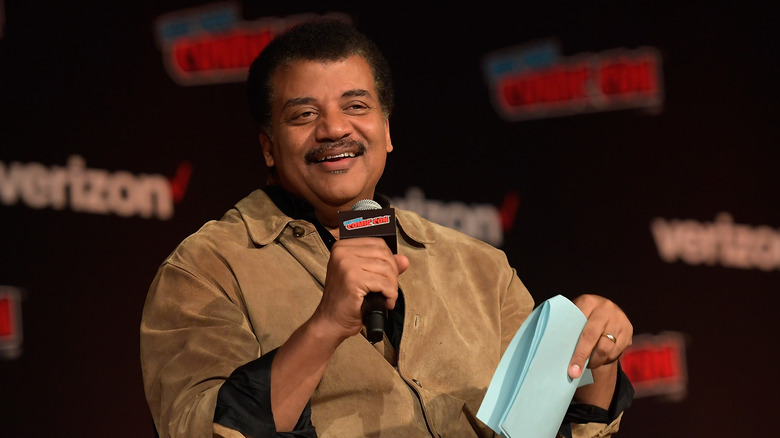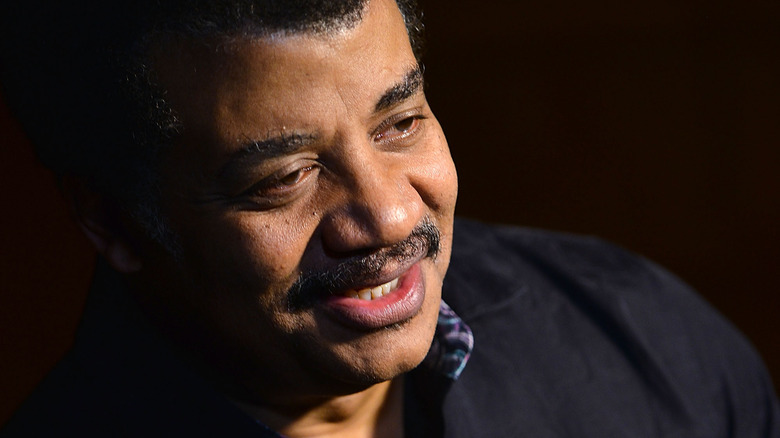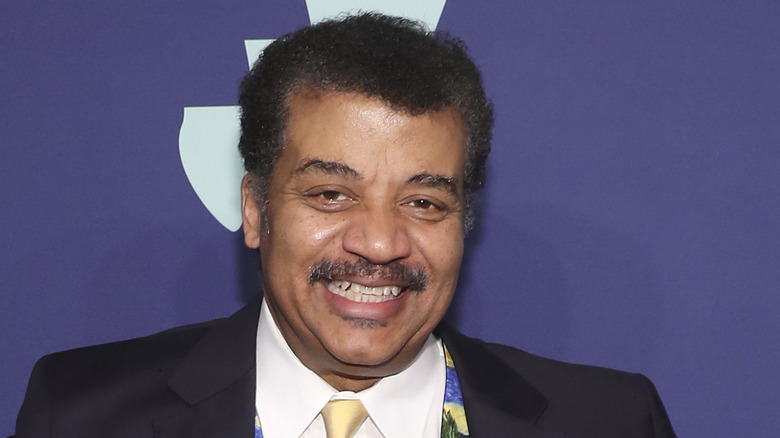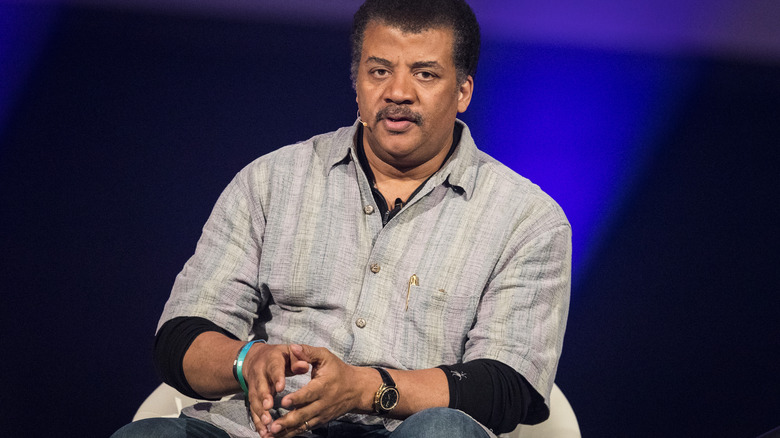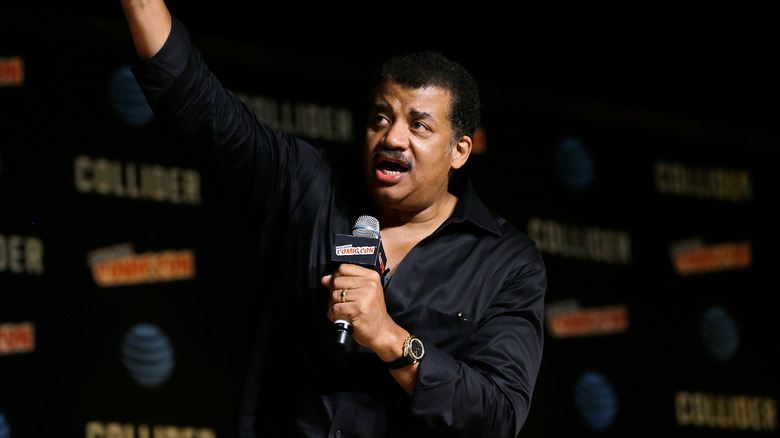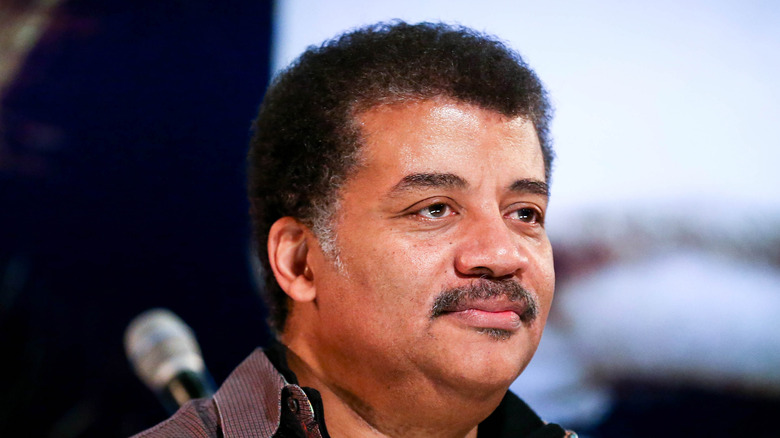The Untold Truth Of Neil deGrasse Tyson
Astrophysicist Neil deGrasse Tyson is a popular name and has undoubtedly left a mark on the world with his work. He is a versatile man who has expressed himself through several platforms, including but not limited to books, television, podcasts, social media, and more (via The New York Times). He's known for being able to explain complex ideas in simple ways, something that makes him a lot more appealing to the public.
Tyson said in an interview with Inverse that he wants science to be a lot more popular among people. He hopes for individuals to discuss science "the same way everyone talks about what's the president doing, what's Beyoncé doing." It would be a dream come true for Tyson to see more enthusiastic discussions on science in general.
Moreover, the astrophysicist is someone who's self-aware and doesn't shy away from admitting quirky things about himself. He told The Guardian in 2016, "The thoughts I have every day are the kind of thoughts others might only have in a bar, in a pub after a couple of beers when they are contemplating their existence, but we do this all the time in astrophysics."
Neil deGrasse Tyson was drawn to astrophysics as a child
According to Biography, Neil deGrasse Tyson was born in October 1958 in New York City. He was very young when he realized that he was fascinated by space. The turning point for him was going to the Hayden Planetarium located inside the Museum of Natural History, where he got the opportunity to look at the stars. He wrote about the experience in his book, "The Sky is Not the Limit: Adventures of an Urban Astrophysicist," and said that he was just 9-years-old when he went to the planetarium but knew that he had discovered his calling.
He wrote that he caught his first real glimpse of the Milky Way that night and was blown away by what he saw. "That was the night. I had been called," he wrote. "The study of the universe would be my career, and no force on Earth would stop me." Also, he told The New Yorker that he was a changed man after his first experience at the Hayden Planetarium because he had never witnessed anything similar in his life until that moment.
Also, as a kid, Tyson would display his passion for science in interesting ways. For example, he would transform one of the bathrooms into a darkroom whenever he got the opportunity and found a way to use weights to "automatically" shut the bedroom door that was always open thanks to his sister.
His parents rooted for his passion
One of the things that helped Neil deGrasse Tyson chase his passion for the sciences was the fact that his parents really wanted him to succeed. As he wrote in "The Sky is Not the Limit: Adventures of an Urban Astrophysicist," his dad worked as a sociologist while his mom pursued a graduate degree in gerontology. They weren't familiar with science but encouraged their son when he made it clear that he was drawn to the field. Tyson wrote, "With my telescope, camera, and other observing accessories, I would drag both of my parents (separately and together) in and out of cars, up and down stairs ... all in the support of my astrohabit."
One incident stood out from the time he was in the seventh grade: Tyson desperately needed certain accessories to make his wooden Saturn lamp, and his mom helped him by visiting many electric shops with him just so that he could finish the project. Additionally, Tyson's parents often purchased math and science books and would schedule regular visits to museums. The astrophysicist acknowledged that his parents allowed him to be free as a child, encouraging him to learn without setting strict boundaries. He wrote, "My parents never told me where to go or what to learn, which ensured that my life's interests were as pure as space itself."
He doesn't think highly of the education system
For Neil deGrasse Tyson, the education system was not great to begin with. This might have something to do with the fact that he didn't have a great time in school (via The New Yorker). He went to public schools and liked interacting with his peers. However, his teachers often complained that he was "inattentive" in class. Later in life, the astrophysicist said that it's essential for teachers to focus on all kinds of students, not only the ones with the highest grades. Per Tyson, if the other kids receive more attention, they may have better chances of succeeding in the future.
Tyson didn't mince words when he was asked to speak at his former elementary school. He refused to be a part of the event and shot back, "I am where I am not because of what happened in school but in spite of it, and that is probably not what you want me to say. Call me back, and I will address your teachers and give them a piece of my mind."
Also, Tyson once put up a strongly worded tweet that made his feelings clear. He wrote, "Students who earn straight 'A's in school do so not because of good Teachers but in spite of bad Teachers."
Carl Sagan was a fan
Late astrophysicist and author Carl Sagan had a strong influence on Neil deGrasse Tyson when he was an aspiring scientist. Tyson wrote in "The Sky is Not the Limit: Adventures of an Urban Astrophysicist" that he first came across Sagan as a 17-year-old, when he sent an application to Cornell University. Sagan was a professor at the university, and he was shown Tyson's application, which was so impressive that the scientist chose to invite Tyson to come see him in Ithaca, New York.
Tyson described Sagan as a "warm" and "compassionate" man who was kind enough to drop off Tyson at the bus station after their meeting. He also gave him his number just in case the bus was unable to take Tyson home on account of poor weather conditions. Tyson was touched by how considerate Sagan was and wrote, "I never told him this before he died, but at every stage of my scientific career that followed, I have modeled my encounters with students on my first encounter with Carl."
Per Business Insider, Sagan was also gracious enough to gift Tyson a book, "The Cosmic Connection." Tyson said on his show, "Cosmos: A Spacetime Odyssey," that Sagan even called him a "future astronomer." Tyson was moved. He said, " I already knew I wanted to become a scientist, but that afternoon I learned from Carl the kind of person I wanted to become. He reached out to me and to countless others."
Neil deGrasse Tyson was almost an exotic dancer
Neil deGrasse Tyson definitely has a few surprises up his sleeve. Here's one: According to The New Yorker, he nearly signed up to become an exotic dancer at a club as a post-graduate student at the University of Texas at Austin. He shared more details in his biography and wrote that he was a struggling graduate student who was barely making enough money to afford a few decent meals everyday. He even lost weight around this time and started thinking of other ways to make more money.
To this day, he can't explain why, but Tyson wondered whether he should become a male stripper at a local club and perform a couple of nights each week. He explained that he was "relatively flexible" and had been a part of dance troupes before. He went to the club to observe the strippers in person. This is how he ended up changing his mind. Basically, Tyson didn't want to do what the other dancers were doing and wear jock straps while dancing. He wrote, "These [jock straps] were specially designed with an asbestos lining that had been soaked with lighter fluid." Dancers would set these on fire and perform onstage fearlessly, which was more than what Tyson could handle. He ended up tutoring students instead.
He established an astrophysics department at Hayden Planetarium
Neil deGrasse Tyson has been associated with the Hayden Planetarium ever since he was a child. According to The New Yorker, he was appointed as the director of the planetarium in 1996. The creation of an astrophysics department was part of the deal. Tyson, it must be noted, took his new role very seriously and got straight to work. Early on, he was asked to help modernize the original planetarium, a task that was made difficult because people weren't too confident about the idea and how feasible it actually was.
Despite the roadblocks, Tyson was able to do a good job of convincing the Landmarks Preservation Commission that a new space would be beneficial in more ways than one. It helped that he was a huge fan of the building himself and ensured that everyone knew about it. Per CBS New York, Tyson wanted to make the space bigger and better than it was. He said, "The goal was to open up the universe into a place that makes it accessible to everyone, not just close it up into a planetarium dome. The whole facility is a museum of the universe."
Kids sent him angry letters
In 2000, the Rose Center for Earth and Space (aka the old Hayden Planetarium) subtly removed Pluto from its massive model of the solar system. According to Mental Floss, people were surprised after they realized what had happened, but things didn't escalate until a few years later. Neil deGrasse Tyson remarked at the time, ”We're not that confrontational about it ... you actually have to pay attention to make note of this" (via The New York Times). In 2006, there was an official announcement: Pluto would not be considered a proper planet by the International Astronomical Union and would be called a "dwarf planet" instead.
Students from elementary schools around the country were rather upset by this development and sent lots of angry letters to Tyson, as director of the facility. A 7-year-old child wrote in a letter to the astrophysicist, "Dear Natural History Museum, you are missing planet Pluto. Please make a model of it. This is what it looks like. It is a planet. Love, Will Galmot." The kid even attached a sketch of the planet to illustrate their point.
He is wrongly perceived to be an atheist
According to The New Yorker, Neil deGrasse Tyson identifies as an agnostic but usually prefers to not rely heavily on labels. His childhood did include visits to the church, but he couldn't help but start asking questions by the time he was a teenager. He declared, "My confidence that there is a loving God who cares at all for your health or your longevity, based on what I see in the physical universe, is so low that it is not something that I would spend any time investing in, to try to explore any further about whether or not it's true."
The scientist added that this doesn't mean that he doesn't want others to research on this, and he's willing to keep an open mind. In a video clip on the Big Think YouTube account, Tyson said that he simply doesn't want to get into arguments on the topic. He also said that he has spotted claims of him being an atheist on his Wikipedia page in the past. "I can't gather around and talk about how much everybody in the room doesn't believe in God ...I don't have the energy for that," he said. Tyson added that if he could get away with it, he would not be in any "category" as far as this topic is concerned.
Philosophy doesn't appeal to him
In 2014, Neil deGrasse Tyson managed to ruffle many feathers when he spoke against philosophy and claimed that it's best for students to avoid studying the subject in the first place. According to Gizmodo, the scientist shared his views on the Nerdist podcast when someone told him that they studied philosophy: "My concern here is that the philosophers believe they are actually asking deep questions about nature. And to the scientist it's, what are you doing? Why are you concerning yourself with the meaning of meaning?" He also went on to imply that he doesn't believe that those who study philosophy are being productive in helping others make sense of the world.
Philosopher and biologist Massimo Pigliucci was not happy with Tyson and wrote in his blog that the scientist had insulted philosophy in the past as well and wasn't alone in saying these things about the topic. Pigliucci added, "But in his case the offense is particularly egregious, for two reasons: first, because he is a highly visible science communicator; second, because I told him not to, several times."
His views have caused some serious outrage
In 2019, a couple of devastating mass shootings took place in El Paso, Texas, and Dayton, Ohio, that left many people shaken and led to the loss of several innocent lives. According to The New York Times, Neil deGrasse Tyson decided to post his controversial views on Twitter at that point, and his words upset many people on the social media platform. The scientist basically listed the number of people who died in the shootings before talking about the total number of Americans who are killed on average in a span of two days because of other factors such as suicide, car accidents, medical errors, homicide, and more. Tyson added the words, "Often our emotions respond more to spectacle than to data."
Per CNN, many lashed out at the scientist for being insensitive, and he had to eventually apologize for his remarks. He tried to justify his actions and wrote on Facebook, "My intent was to offer objectively true information that might help shape conversations and reactions to preventable ways we die ... I apologize for not knowing in advance what effect my Tweet could have on you."
He is an unapologetic perfectionist
As an outspoken scientist who has a decent fan following on social media, Neil deGrasse Tyson is someone who's known for chasing perfection quite openly. Here's an example worth considering: According to The Washington Post, the scientist went after filmmaker James Cameron because of an inaccurate detail that he spotted in the 1997 film, "Titanic."
Per Cameron, the scientist was pretty "snarky" in his e-mail when he told him that "in that position in the Atlantic in 1912, when Rose (Kate Winslet) is lying on the piece of driftwood and staring up at the stars, that is not the star field she would have seen." Cameron did take this feedback seriously and asked Tyson to send the recommended changes, which he added to the film when it re-released.
Per The New Yorker, Tyson is a perfectionist in other ways too. Whenever he's supposed to make a public appearance, for example, he goes to great lengths to make sure that he does everything it takes to get ready for the event. When he was working on his debut on "The Daily Show," Tyson conducted extensive research on the previous episodes and paid attention to the details so that he was ready for his appearance on the show. The show's host, Jon Stewart later said, "[I] remember that we had a Rubik's Cube sitting in the greenroom, and he had to solve it. He can't leave things unsolved."
Being in the public eye is uncomfortable for him
Despite being such a well-known personality, Neil deGrasse Tyson isn't a man who likes being famous and making so many public appearances. He told Vox in a candid confession that he is actually someone who'd choose to stay at home with his wife and spend some quality time with his children or focus on his research interests in a laboratory instead of being a part of a flashy new project. Tyson explained, "I don't start my day thinking about how I can bring the universe to the public."
However, this is where things get interesting: Tyson said that when someone does approach him for a project like a documentary, it gets really difficult for him to say no to the opportunity because he wants to help out in his own way. Tyson said, "I think, 'Okay, I have an expertise, and they're in search of that expertise to serve their needs,' so I come when called."
